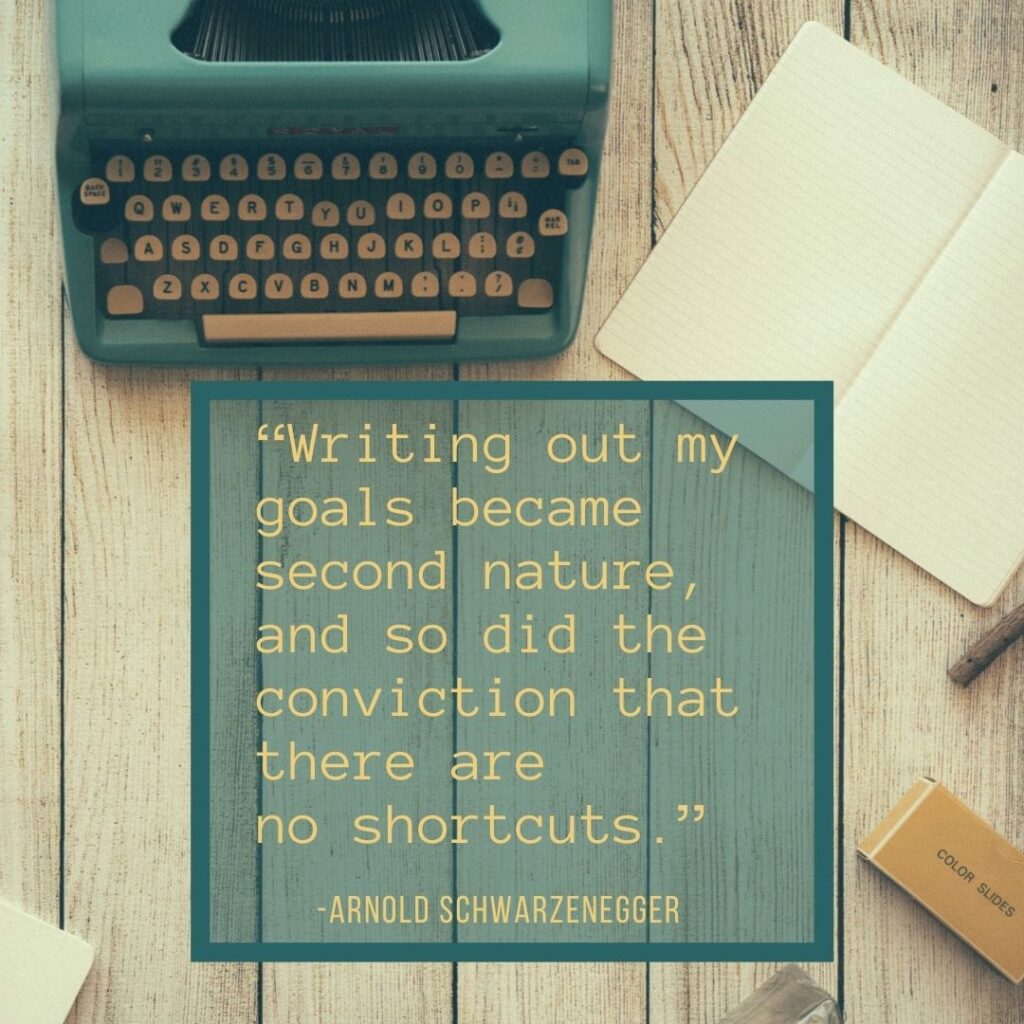You know him from iconic Hollywood roles such as The Terminator, Conan, and Kindergarten Cop. As the two term Governor of California, an investor, a successful businessman, chess player, champion body builder, and much much more. However, you may be surprised to learn that fame and recognition wasn’t always the case for Arnold Schwarzenegger.
In 1968 Schwarzenegger moved from Europe to Los Angeles and was the ultimate outsider. He didn’t speak English, he had a thick Austrian accent, and he struggled to stand out amongst a sea of other folks trying to “make it.”
But do you know what Arnold is great at?
He’s great at setting and writing down specific goals. “Writing out my goals became second nature, and so did the conviction that there are no shortcuts.”
“It wasn’t sufficient just to tell myself something like “My New Year’s resolution is to lose twenty pounds and learn better English and read a little bit more.” No. That was only a start. Now I had to make it very specific so that all those fine intentions were not just floating around. I would take out index cards and write my goals down.”
Here are some of Arnold Schwarzenegger’s first goals:
- Earn enough money to save $5,000
- Get twelve more college credits
- Work out five hours a day and gain seven pounds of solid muscle weight
- Find an apartment building to buy and move into
But does setting such specific goals actually handcuff you?
When you set a goal that is super specific you give yourself the freedom to achieve it by any means necessary. When you make a goal that is vague the path to get there becomes less clear. It’s a small difference, but for Arnold it made all the difference in his success.
He says, “It might seem like I was handcuffing myself by setting such specific goals, but it was actually just the opposite: I found it liberating. Knowing exactly where I wanted to end up freed me totally to improvise how to get there. Take that twelve more college credits I needed, for example. It didn’t matter which college they would come from; I would figure that out. I’d look at which courses were available and what the credits cost and whether they fit my schedule and the rules of my visa. I didn’t need to worry about the exact details now, because I already knew I was going to get those dozen credits.”

Have you ever set a New Year’s resolution?
Okay… This is a silly question because I know you have. But answer this one instead.
How many days into the year did you make it before you realized your resolution was pointless and you tossed it? Maybe you admitted you no longer care enough about the goal to stick with it for the rest of the year?
I had the same problem. I would set a goal to build 10 pounds of muscle, learn how to invest my own money, quit drinking soda, or read the entire Bible in one year, and then within a couple of weeks I’d quit.
Why?
New Year’s resolutions are short sighted and just don’t work. For me they have always been vain and manufactured based on what other people thought was important.
New Year’s resolutions are broke and they don’t help us move closer to our dreams.
Enter the Family Board Meeting
I knew I needed a better plan and that I wanted to write my goals down, but I didn’t know where to begin.
Then I came across this obscure line from Dave Ramsey’s book EntreLeadership, “Zig calls it “the wheel of life.” The wheel has spokes that represent each area of our lives, and for our lives to be successful as a whole we must address each area. The spokes of goal setting are 1. Career 2. Financial 3. Spiritual 4. Physical 5. Intellectual 6. Family 7. Social.”

Lightning struck and I immediately knew what to do. I took Arnold Schwarzenegger’s goal setting techniques from Total Recall and merged them with the wheel of life buckets from Zig Ziglar. Then I made a few tweaks and the Family Board Meeting was born.
- Spiritual
- Physical
- Intellectual
- Family
- Social/Community
- Finance
- Career
If you adopt the Family Board Meeting rhythm you will to start by dreaming big and designing 20-year goals for every important bucket in your life. Then you’ll refresh them yearly, check-in on them quarterly, and always be working on short term, middle term, and long term plans.
“Individuals with written goals were 39.5 percent more likely to succeed. But there’s more to the story. Individuals who wrote their goals and sent progress reports to friends were 76.7 percent more likely to achieve them.”
Shop Class as Soulcraft, by Matthew B. Crawford
Twenty year goals
The whole Family Board Meeting process starts by sitting down and dreaming big.
What do you want your life to look like in twenty years?
Don’t hold back. Don’t second guess yourself. Don’t set any limits, expectations, or spend any time worrying about how you will accomplish these big goals. There will be a time for figuring out the path later.
Do dream big. Do surprise yourself and take a chance to be honest and transparent. Do write down goals that scare you.
Have you thought you wanted to write a book, but you never started? Write that down.
Do you want to find a partner, get married, and have babies? Write that down.
Maybe you want to quit your job and start a business helping other entrepreneurs find their purpose and start businesses? Yep, write that down too.
But even these goals might be too small for you. The idea is to completely shock yourself and write down what you have been too afraid to share with the people closest to you.
“Like a magnetized needle floating on the surface of oil, Resistance will unfailingly point to true North— meaning that calling or action it most wants to stop us from doing. We can use this. We can use it as a compass. We can navigate by Resistance, letting it guide us to that calling or action that we must follow before all others. Rule of thumb: The more important a call or action is to our soul’s evolution, the more Resistance we will feel towards pursuing it.”
Steven Pressfield, The War of Art
Take the seven buckets and write down a few big-time goals in each bucket.
- Spiritual
- Physical
- Intellectual
- Family
- Social/Community
- Finance
- Career
When I first went through this 20-year exercise I wrote that I wanted my career to be an author, podcaster, speaker, and coach. But there was a massive problem.
I wasn’t writing, I didn’t have a podcast, I had zero coaching clients, and a speaking gig was the furthest opportunity from reality.
But I wrote down the goals anyway. I didn’t worry about how to get there.
By following the quarterly meeting plans I eventually broke down my big goals into smaller goals and launched this blog and began writing. The blog has lead me to coaching opportunities, podcasting, and speaking arrangements. I haven’t achieved the 20-year goal yet, but I’m working on it and during each quarterly meeting and retreat I set a track to get closer and closer.
Quarterly meeting and retreat
My wife and I have found that quarterly board meetings work best when we’re away from the distractions of everyday life at home. To combat this we take a weekend every 3-months to go off the grid somewhere to rest, recharge, and to build our plan for the next quarter. If this isn’t possible for you, don’t worry. You can still follow the Family Board Meeting plan. I suggest going to a park, a coffee house, or somewhere outside of your home where you can completely disconnect and focus on your future.
We begin our board meeting by rating on a scale from one to five how we are feeling about each of the seven buckets. We don’t choose the number three though because it can be a cop-out. We have to pick a one, two, four, or five.
Once we separately score each bucket we come back together and synchronize on what our wins and strengths are. We stress the importance of continuing to win in our top buckets because we want to maintain our strengths and not only set goals for our opportunities. At first we skipped working on our strengths and 3-months later we had dropped the ball and we needed to rebuild our strengths all over. That’s not the way to make progress towards your 20-year goals.
Next, we discuss our low scoring buckets and why we feel they’re opportunities. We usually determine it’s from a lack of focus or we had previously set unclear or unrealistic goals.
Finally we look at the list of annual goals we set at the first quarterly meeting of the year and we revisit our list of 20-year goals. With these two lists in hand we create bite sized goals for each of the seven buckets. These goals need to be achievable in the next 3-months.
Here are some of our more recent goals:
- Spiritual: Go through an Abide app meditation together each morning
- Physical: Get back our blood labs, make any nutrition changes, and complete one strength workout per week
- Intellectual: Order new magazine subscriptions and goto the library once per month
- Family: ScreenLESS Sundays each week and choose a new holiday to make traditions around (we later picked Memorial Day)
- Social/Community: One happy hour with our neighbors per month
- Finance: Give to our church each week and find a few additional charities to donate to
- Career: James: record first podcast episode and Emily: finish graphic design course
After our quarterly meeting and retreat we return home with a list of 7-10 small goals to accomplish over the next 90 days.
At home we look through the goals once more and open our shared family calendar to schedule them. Stephen Covey says, “The key is not to prioritize what’s on your schedule, but to schedule your priorities.” And I can’t agree more. When we don’t take this final step in our Family Board Meeting process we fail to accomplish our goals. Plain and simple, adding our priorities to our calendar has made all the difference.
Summary
It’s time to get started. It’s time for you to surprise yourself and put your biggest dreams down on paper.
Don’t be afraid. I know how scary it can be to write down big goals.
What if you don’t achieve your goals and everyone laughs at you and you feel sad, embarrassed, and alone?
It’s actually the opposite. If you don’t write down your goals and you don’t share them with those around you they will never happen.
Are you afraid of being laughed at? Or are you afraid of what would happen if you actually achieved your goals? Steven Pressfield shared in The War of Art, “Remember our rule of thumb: The more scared we are of a work or calling, the more sure we can be that we have to do it. Resistance is experienced as fear; the degree of fear equates to the strength of Resistance. Therefore the more fear we feel about a specific enterprise, the more certain we an be that enterprise is important to us and to the growth of our soul. That’s why we feel so much Resistance. If it meant nothing to us, there’d be no Resistance.”
So my challenge to you is this… Do be afraid. Do write down scary goals. And do follow The Family Board meeting plan to achieve them. Please let me know in the comments below how it’s going and how I can help. I’ll read and respond to you.

2 replies on “Learn To Set Goals Like Arnold Schwarzenegger and Zig Ziglar”
Outstanding resource James. This is life changing stuff. Thanks for sharing your wisdom.
Thanks for reading, Tim! This post was long overdue, as you know! Thanks for your encouragement.